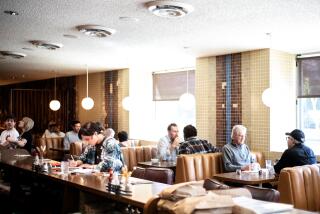Tables turn for city’s top toques
A magnitude 10 earthquake shook Southern California this week, and the epicenter was the kitchens of three of the area’s top restaurants.
* Alain Giraud, founding chef at Bastide, the Los Angeles Times’ only four-star restaurant, and Bon Appetit magazine’s chef of the year in 2003, was replaced by Ludovic Lefebvre, a former chef at L’Orangerie.
* Michael Cimarusti, chef at downtown’s 3 1/2-star Water Grill, announced that he is leaving the restaurant to open his own place.
* And David Rosoff and Jason Travi, the team at Opaline, which is best known for Rosoff’s highly regarded wine program, are leaving as part of a general restaurant makeover.
Though they all share great reputations, the reasons for the restaurants’ changes are as varied as their individual styles, which range from cool elegance to friendly informality.
The most surprising of the three exits was that of Giraud, who had racked up rave reviews since Bastide opened a year and a half ago. Still, restaurant owner Joe Pytka says, there is room for improvement, and he thinks Lefebvre is the guy to do it. He says that he and Giraud are in the process of hammering out the details for another smaller, more casual restaurant to open at a site and date still to be determined.
“I’ve been wanting to crank Bastide up one more notch to the higher end, and Alain was kind of thinking that might not be the best thing to do,” says Pytka, a noted director of television commercials. “Ludovic was ready to commit on another deal, so I had to make a move right away or lose him.”
Differences at Bastide
For his part, Giraud had long been reported to have been frustrated with some of Pytka’s unusual dictates -- even before the restaurant opened. First, Bastide was only open on weekdays. Then Pytka changed his mind, opening on Saturday, but closing for lunches. Only French wines were served, and diners were not allowed to bring their own bottles, no matter how special the wine or the occasion.
Giraud was clearly shocked by Lefebvre’s hiring, but remained diplomatic. In a prepared statement he said: “In the past few months I have had creative differences with Joe about the present and the future of Bastide. The plan now is for me to go back to my initial concept for the restaurant, which was more casual, and to be able to keep my cooking style. I will meet with Joe in the very near future to determine our involvement in the next project. I cannot comment on the future of Bastide because I haven’t been involved in the process.”
Pytka says Giraud’s new restaurant will be more along the lines of L.A. Italian places like Il Pastaio and Angelini Osteria: “Someplace with simple service but really good food, only in a more casual way. I want it to be a hangout with really good food. The Italians have done those places beautifully.”
Scouting for a location hasn’t begun yet, but Pytka says he’d like the restaurant to be in Venice, because that’s where his production office is, “but I’m not sure that is the right place.”
Giraud, who came to Los Angeles to help Michel Richard open Citrus in 1988 and then headed Lavande in the Loews hotel in Santa Monica, had earned rave reviews for his work at Bastide.
There is “perhaps no finer dining experience in America than under the olive trees at Bastide,” wrote Bon Appetit magazine when naming Giraud chef of the year in October. “While the decor, service, and wine are outstanding, it is Giraud’s clean, subtle style of haute cuisine that is receiving the most notice.”
Times restaurant critic S. Irene Virbila wrote: “Bastide has it all -- graceful French cooking from a mature chef, a chic and sophisticated setting, seriously good service and the indefinable magic that makes you want to go back to a restaurant again and again. It also happens to be lively and fun in an understated, grown-up way. It’s a pleasure to see a chef of such obvious abilities finally reach for the stars.”
Lefebvre had spent the last couple of years since leaving L’Orangerie trying to raise money for his own restaurant. Last October he changed plans and agreed to become chef at a new restaurant to be called Ludo in the W hotel in Westwood. But then he talked to Pytka, whom he had sought as an investor for his own restaurant.
“I won’t get a second opportunity like this in my life,” Lefebvre says, explaining why he jumped at the chance to take over Bastide even though he regards Giraud as a friend. “It’s a lot of pressure for me. It’s the only four-star restaurant in Los Angeles. But I believe in myself. I know what [Pytka] wants. We are on the same page.”
One person close to the restaurant says Pytka was looking for cooking that was more “fun” than the elegant cuisine for which the restaurant has become known. If so, Lefebvre is ready to deliver -- in spades.
“I want to do surprising food,” he says. “I want to create new tastes. My recipes one day will be pieces of art.”
Lefebvre says he is particularly excited by Asian and Indian ingredients such as lemongrass, ginger, green tea, black vinegar and the whole spectrum of Chinese herbs. “The world is big, and I have just been to India and Asia. Maybe I will go to Russia and Africa next. South America too. I love food with personality, with flavor.”
His cuisine will be a distinct departure from what Bastide is today. “Beautiful food sometimes disappoints,” he says. “I want you to remember what you eat when you come to my restaurant.”
Among the dishes Lefebvre mentions as possibilities for the menu are beef with “candied chocolate” and a sauteed chicken breast served with sweet caramel popcorn scented with ginger.
Equally memorable will be his design ideas. When building the $3.5-million Bastide, Pytka hired noted Parisian designer Andree Putman to create a sense of elegant serenity. To symbolize his departure from Bastide’s purely French cooking and his own love affair with exotic spices, herbs, oils and vinegars, Lefebvre plans to create a wall in the restaurant to showcase the hundreds of ingredients he will use to build his cuisine.
“It will be a wall of different flavors from around the world,” says Lefebvre. “Spices and ingredients in jars, so you can look at them. Every day I am going to take five ingredients and play with them. And that will be the basis of the specials. The combinations are infinite. I want to play with that, to be a magician.”
Inspired by having read the bestselling thriller “The Da Vinci Code,” Lefebvre says he is also going to create a place in the restaurant he calls “The Secret Room,” where he will serve small parties with one-time-only special dishes. These menus will be memorialized in a handwritten manuscript book that will be the room’s centerpiece.
Pytka acknowledges that the change might be interpreted as ditching Giraud for Lefebvre, but he insists that isn’t the case.
“People are going to say I fired Alain and hired Ludovic, but that’s not the thing at all,” he says. “It’s just a matter of different things for different people. Alain is a more casual guy and I’m not sure he ever felt as comfortable as he wanted to be with the concept of Bastide.
“From the start, Alain felt more comfortable going into a more casual restaurant without all the pressures of a place like Bastide. Ludovic felt more challenged by the opportunity.”
Goodbye to Water Grill
Cimarusti, who has been at Water Grill since 1997, says he is leaving to cook on a more intimate scale. Water Grill, which was originally conceived of as a business person’s fish grill, seats more than 150 customers.
Despite that, Cimarusti was able to present food that was challenging and delicious. Water Grill “has matured into not only the best seafood restaurant in L.A. but one of our best restaurants, period,” wrote Virbila. “Cimarusti has always been a passionately intelligent chef; but now his cooking seems more personal. His dishes don’t resemble anybody else’s. They’re his own. He’s pared down his ideas to their essence, so that they deliver a one-two punch with bold flavors and sensual textures.”
His new place will have approximately 90 seats and will be devoted to the kind of experimental cooking he has been able to feature only on special menus at Water Grill.
“For a long time, for me, running a big restaurant like Water Grill was the most intriguing thing in the world,” says Cimarusti, who came to the restaurant after working at Le Cirque and Osteria Circo in New York and Spago in Hollywood.
“King’s Seafood Co. [which owns Water Grill] had a very successful restaurant that did good business, but they wanted to elevate the level of their cuisine,” he says. “I looked at it as a great challenge, and they threw every support they could behind me. They were great, and it was a very good seven years.
“But something I’ve always had as a goal is to do a fine-dining seafood restaurant where I could focus more attention on each and every guest experience.”
Cimarusti’s departure date at Water Grill has not been finalized, nor has the location and opening date of his new place, but he says he hopes to have it up and going by Christmas.
New designs at Opaline
Rosoff and Travi are leaving Opaline in a parting of ways with business and financial partner Jonathan Horne. Only a year and a half after its opening, Opaline is to be redesigned with a new menu and a new chef, although the schedule and concept have yet to be determined.
“The restaurant never operated as profitably as we had hoped, and my partner has elected to take things in a somewhat different direction,” says Rosoff, who was the sommelier and guiding force behind the wine- focused restaurant from its inception. He says there are no plans to close Opaline while Horne sorts through his options.
Although it might not have lived up to financial expectations, Opaline was exactly what Rosoff wanted it to be, he says. A former general manager at Michael’s in Santa Monica, Rosoff created a restaurant centered on an adventurous yet affordable wine list. A champion of underappreciated wines from lesser-known regions, he created a restaurant label, Opalmina, with one of the partners of Santa Barbara’s cult-favorite winery Brewer-Clifton.
After initially panning Opaline’s food as overly ambitious and poorly executed, The Times’ Virbila revisited the restaurant when Travi took over after working at Spago. Her second review, in April, was glowing: “Not only has the food found a better focus, but the wines are also faring much better without all the fussy distractions of the previous menu. Travi’s menu is less about him and more about the kinds of dishes that will show the wines to advantage.”
Travi, 29, learned of Rosoff’s decision to leave the restaurant Friday and an hour later accepted the executive chef’s position at Gino Angelini’s new restaurant, La Terza. “We had all heard the rumors,” he says, noting that he had been in talks with Angelini.
Set to open in July, La Terza will be an Italian restaurant “a hair more fine-dining” than Angelini Osteria, said Travi, adding that there will be more room between tables, a quieter ambience and a bar and outdoor patio. It is under construction in what used to be Cava on the first floor of the Orlando hotel on 3rd Street, between Fairfax and La Cienega boulevards.
If there was a mistake in the development of Opaline, reflects Rosoff, it was underestimating the importance of creating a bar scene. While the restaurant had a side room for drinks and hors d’oeuvres, it didn’t have the energy of a tended bar.
“A thriving bar is a plus,” he says. “Without it, you have to manufacture that energy and buzz some other way. I would certainly require a bar in the next place I develop.”
The changes are set in Los Angeles’ current climate of financial strain in the restaurant business. Meat and milk prices have doubled in the last year just as restaurant patronage has softened, according to local restaurant consultants. At the same time, diners are spending less on wine, a traditional financial cushion for restaurateurs.
These pressures have slowed the restaurant expansion that started last fall and are not expected to ease up anytime soon.
More to Read
Eat your way across L.A.
Get our weekly Tasting Notes newsletter for reviews, news and more.
You may occasionally receive promotional content from the Los Angeles Times.







